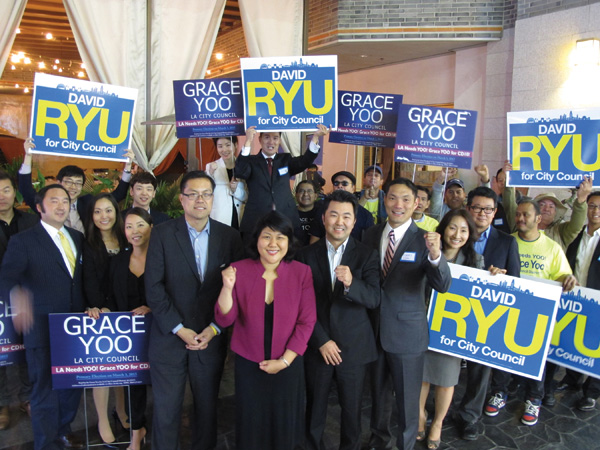The candidates at a Korean American Democratic Committee fundraiser held on Feb. 18. (Photo by Jimmy Lee)
by JIMMY LEE
In a positive sign of the growing diversity of the candidate pool in Los Angeles city politics, two Korean Americans threw their names into the ring for seats on the L.A. City Council this year: David Ryu and Grace Yoo, both of whom are hoping to advance beyond the March 3 primary election.
Ryu, 39, and Yoo, 43, both first-time candidates, are running for two different offices: Ryu in Council District 4, which extends from the Miracle Mile and Hollywood into the San Fernando Valley, and Yoo in the 10th District, which includes most of Koreatown and parts of South Los Angeles.
Both candidates face long odds in their respective races. But if one, or both, can make it into the runoff election in May and win, a momentous feat will have been achieved in Los Angeles. There has been only one Asian American councilmember in the history of the city: Michael Woo, who was elected in 1985, and left office in 1993 to run, unsuccessfully, for mayor.
When it comes to the track record of Asian Americans being victorious in local politics, “L.A. stands out as a sore thumb,” said Raphael Sonenshein, executive director of the Pat Brown Institute of Public Affairs at Cal State L.A. and a longtime observer of local politics. “You see this emergence of a whole generation of successful Asian American politicians [statewide], and I think it will come to L.A. It’s just a matter of time.”
But is 2015 the year when a Korean American can finally inspire a large swath of the populace and get elected in Los Angeles—a place often considered the epicenter of Korean America—and become a de facto leader of its diverse Korean American community? The answer remains to be seen, as of press time.
In 2013, there were three viable Korean American candidates for City Council—the problem is, they all ran for the same 13th District seat. (One of them, John Choi, would eventually make it past the primary consisting of a 12-person field and into the runoff election, but lose to Mitch O’Farrell.) Although they won’t be splitting the Asian American electorate this year, Ryu and Yoo, both of whom have long histories serving the Korean American community, have an entirely different set of obstacles to overcome.
Ryu, a longtime political staffer to former L.A. County Supervisor Yvonne Burke and the director of development and public affairs at a local nonprofit hospital, joined a wide-open field of 14 candidates for the seat being vacated by termed-out Councilmember Tom LaBonge. Some of Ryu’s opponents have extensive political experience or longstanding ties to the area, such as LaBonge’s former chief of staff, Carolyn Ramsey, and Steve Veres, a staff member in state Sen. Kevin de León’s office.
Ryu is not as well-known a figure in the district, since most of his work experience has been focused in South L.A. As a result, since joining the race last fall, Ryu has taken a very direct approach to getting acquainted with the 4th District electorate. “By the time March rolls around, I’m going to have knocked on 8,000 doors,” Ryu told KoreAm in an interview back in January. “I can potentially shake hands with every single person who’s going to vote for me.”
It’s paid off, as Ryu has been one of the top fundraisers in his race. But more so than total dollars amassed, Ryu said he’s proud of the fact that he has solicited the most individual donations among his opponents, in amounts of just $5 or $10 (the limit per donor is $700).
“I don’t have big people [like unions or developers] pulling my string,” said Ryu. “Who am I responsive to? I’m truly responsive to the community.” (L.A. City Council candidates are not required to list the names of donors for contributions of $99 or less.)
Part of Ryu’s message has focused on his background growing up poor in Los Angeles in an immigrant Korean family, and overcoming those odds, thanks to public education and government assistance. In stump speeches throughout his campaign, Ryu has told the story of how ashamed he felt as a child when his highly educated parents had to apply for food stamps. “I want to do service. I am a product of public institutions. This is how government works. It doesn’t work well all the time,” he said. “I believe we can change it. If I didn’t believe in it, why would I be in [the race]? If I thought this didn’t work, why not just quit and just go make money?”
In contrast with Ryu, Yoo—who resigned as the executive director of the Korean American Coalition in Los Angeles, a role which she held for 10 years, to run in this year’s election—is up against a singular, daunting opponent: Herb Wesson, the 10th District incumbent.
A former speaker of the California Assembly and currently the Council president, Wesson, 63, is widely considered to be one of the city’s most powerful politicians. He was cast as the villain by Korean American activists in the L.A. redistricting battle three years ago, when the city’s voting maps were redrawn to dilute parts of Koreatown’s electorate. Yoo, along with Ryu, was one of the most vocal dissenters of the process.
“I would say [the redistricting battle] was a large factor as to why I’m running. It came down to city elected [officials] not listening to what the community wanted,” said Yoo, who also spearheaded a federal lawsuit to void the latest boundaries.
“I said enough is enough. The incumbent hasn’t done what he’s supposed to do,” she told KoreAm.
(Editor’s note: On Tuesday, in a 26-page ruling, U.S. District Judge Consuelo B. Marshall dismissed the lawsuit, saying she found no evidence that race was “the predominant or only motivating factor” in the map-making process.)
A perception among some election observers, though, is that Yoo is running against Wesson because of the redistricting fight. “I think she’s running more of a message campaign,” Sonenshein said. “It’s an extension of the lawsuit.”
The fact that Yoo would choose to challenge Wesson—there is only one other candidate in the race—signals to experts that her motive is more than just to oust the council president.
Sonenshein said that a candidate could run to “raise an issue and keep it in the eyes of people, and to mobilize a bloc of voters for future efforts” and still be “successful without winning.”
“Running for office is an unparalleled opportunity to have a chance to talk to the public and one’s own community,” he said.
But Yoo is adamant that she is in this race to win it. “If I didn’t believe I had a chance to win, I would not be running. There’s no reason to put myself under this strain,” said Yoo, adding she would feel guilty asking friends and family for money if she wasn’t confident of her chances. “I’m running for City Council now because I realize I can help people in an even greater way by becoming a City Council person.”
Yoo and Ryu both have a common supporter in Paul Song, a Korean American physician and also executive chairman of the grassroots leadership development organization Courage Campaign. Song, a regular donor to political campaigns, was a vocal opponent against L.A.’s 2013 redistricting.
“It was less about … the Korean community being unfairly misrepresented [than] that, in general, it [went] against the whole democratic principle,” Song told KoreAm, of the redrawn districts. “And seeing how Grace rolled up her sleeves and led the fight, I applauded that. She’s been a tireless fighter and advocate not just for the Korean community but for justice in general.”
As for Ryu, Song added, “I just feel like he’s somebody who’s been working tirelessly in the community as well. And if anyone could run, these two have earned their right to do so and have the chops to do so.”
Since he is not a Los Angeles city resident, Song can’t vote for either Ryu or Yoo. But he hosted a fundraiser in January for both candidates at the Santa Monica home he shares with wife Lisa Ling, the CNN journalist, because he considers the growing political empowerment of L.A.’s Korean American community important and worthy of support.
“If our community does not wake up and get involved,” Song said, “we’re going to be passed by and not have any [political] representation.”
___
This article was published in the February/March 2015 issue of KoreAm. Subscribe today! To purchase a single issue copy of the February/March issue, click the “Buy Now” button below. (U.S. customers only. Expect delivery in 5-7 business days).







